(PDF) Operations Management in Healthcare
VerifiedAdded on 2021/02/20
|16
|5295
|575
AI Summary
Contribute Materials
Your contribution can guide someone’s learning journey. Share your
documents today.
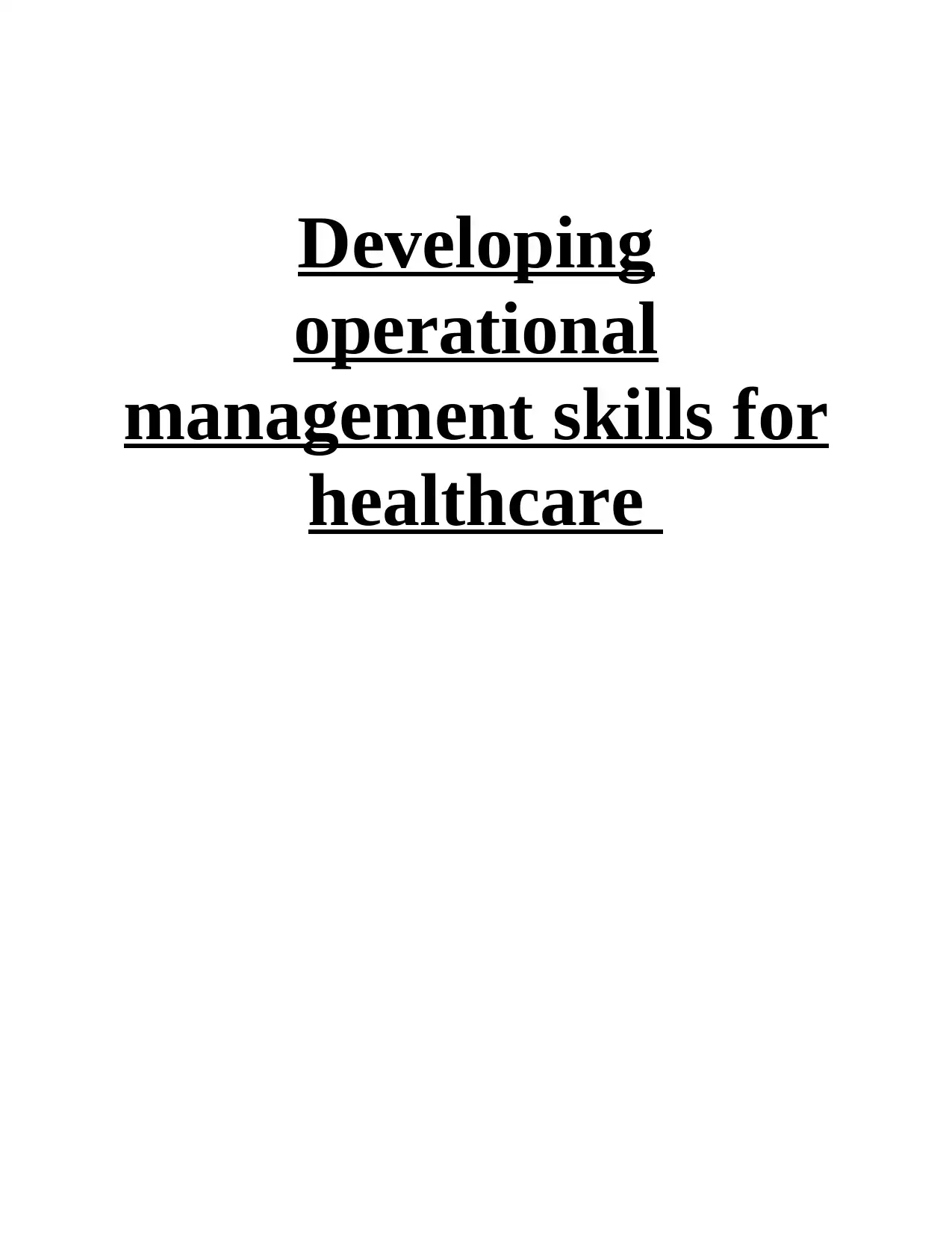
Developing
operational
management skills for
healthcare
operational
management skills for
healthcare
Secure Best Marks with AI Grader
Need help grading? Try our AI Grader for instant feedback on your assignments.
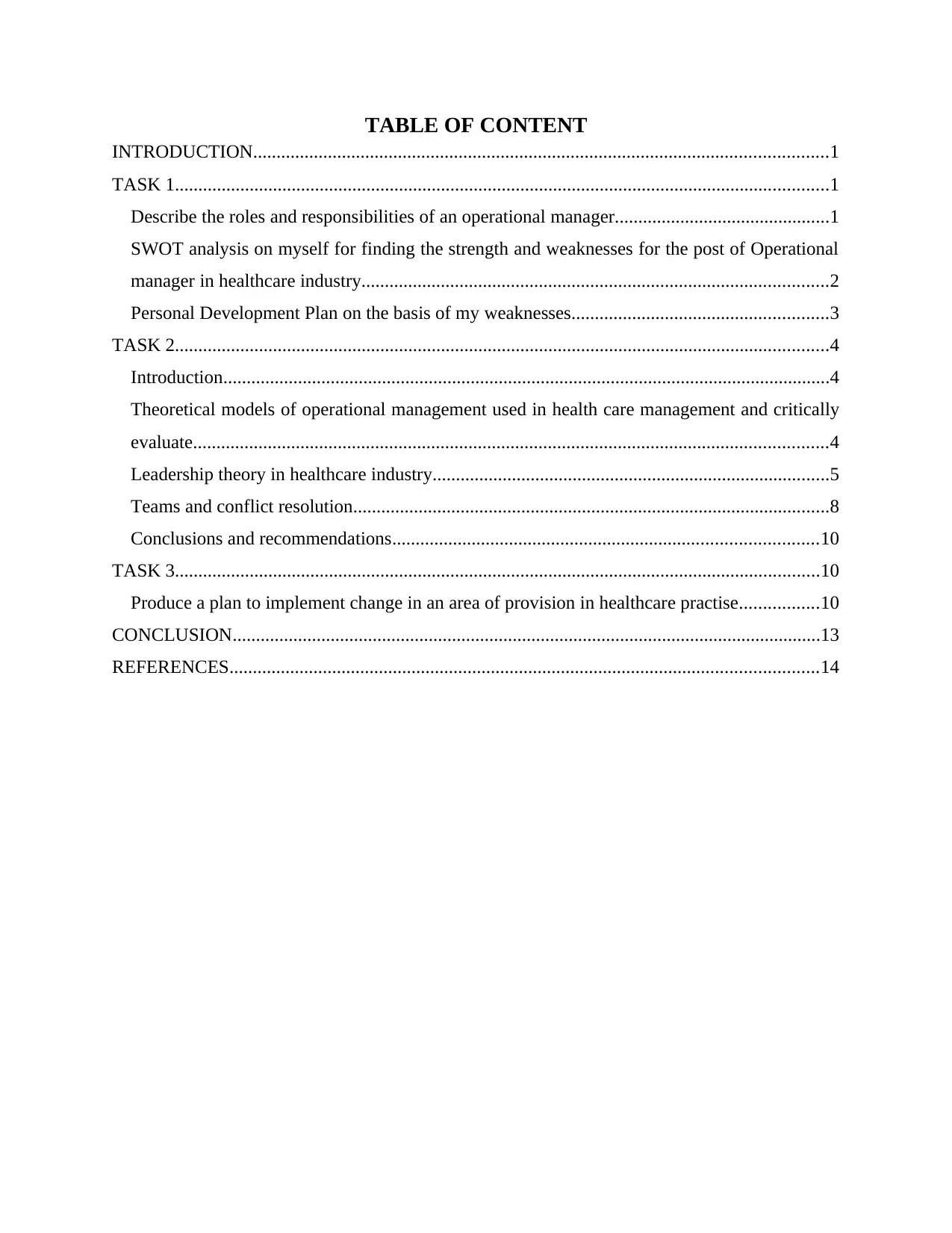
TABLE OF CONTENT
INTRODUCTION...........................................................................................................................1
TASK 1............................................................................................................................................1
Describe the roles and responsibilities of an operational manager..............................................1
SWOT analysis on myself for finding the strength and weaknesses for the post of Operational
manager in healthcare industry....................................................................................................2
Personal Development Plan on the basis of my weaknesses.......................................................3
TASK 2............................................................................................................................................4
Introduction..................................................................................................................................4
Theoretical models of operational management used in health care management and critically
evaluate........................................................................................................................................4
Leadership theory in healthcare industry.....................................................................................5
Teams and conflict resolution......................................................................................................8
Conclusions and recommendations...........................................................................................10
TASK 3..........................................................................................................................................10
Produce a plan to implement change in an area of provision in healthcare practise.................10
CONCLUSION..............................................................................................................................13
REFERENCES..............................................................................................................................14
INTRODUCTION...........................................................................................................................1
TASK 1............................................................................................................................................1
Describe the roles and responsibilities of an operational manager..............................................1
SWOT analysis on myself for finding the strength and weaknesses for the post of Operational
manager in healthcare industry....................................................................................................2
Personal Development Plan on the basis of my weaknesses.......................................................3
TASK 2............................................................................................................................................4
Introduction..................................................................................................................................4
Theoretical models of operational management used in health care management and critically
evaluate........................................................................................................................................4
Leadership theory in healthcare industry.....................................................................................5
Teams and conflict resolution......................................................................................................8
Conclusions and recommendations...........................................................................................10
TASK 3..........................................................................................................................................10
Produce a plan to implement change in an area of provision in healthcare practise.................10
CONCLUSION..............................................................................................................................13
REFERENCES..............................................................................................................................14
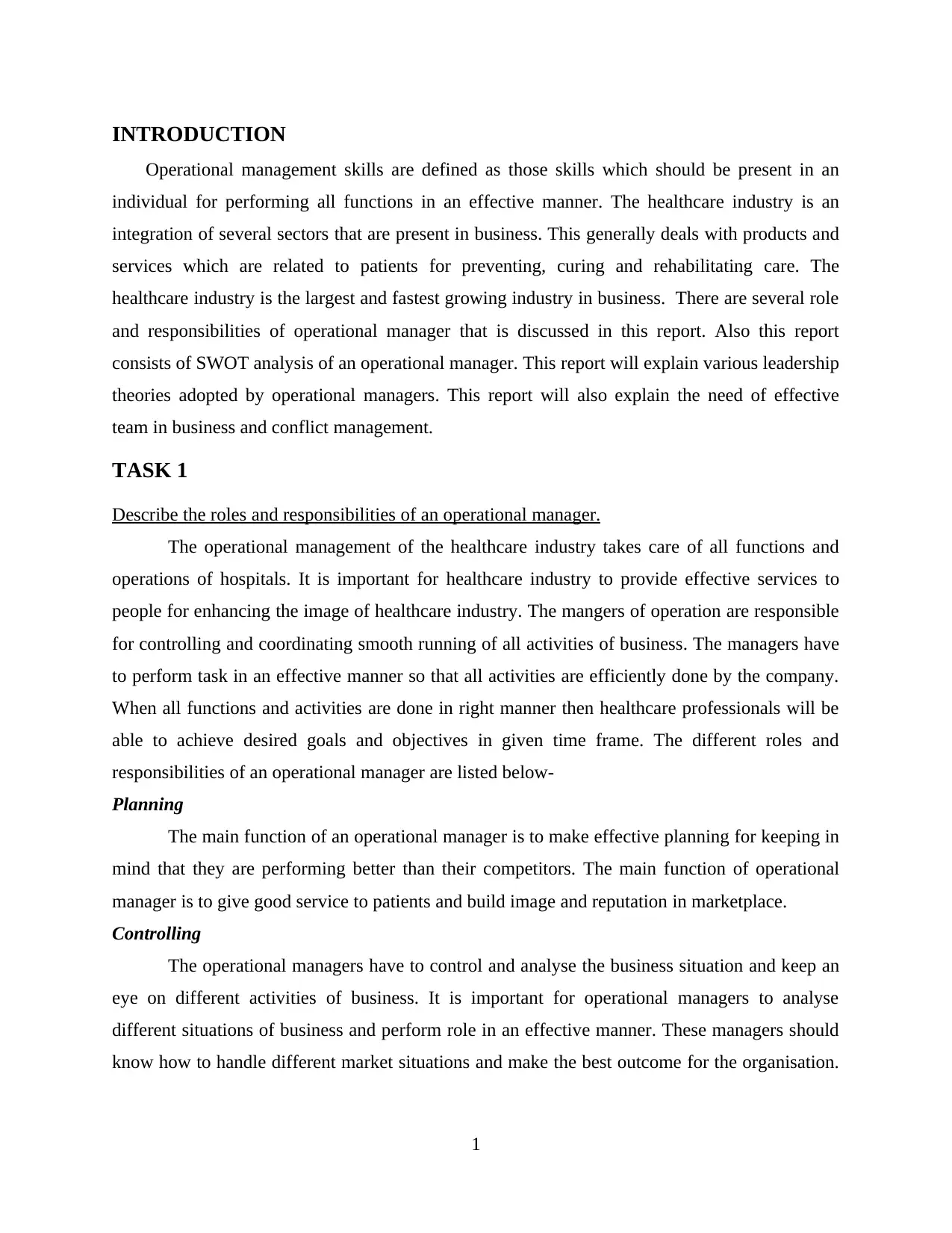
INTRODUCTION
Operational management skills are defined as those skills which should be present in an
individual for performing all functions in an effective manner. The healthcare industry is an
integration of several sectors that are present in business. This generally deals with products and
services which are related to patients for preventing, curing and rehabilitating care. The
healthcare industry is the largest and fastest growing industry in business. There are several role
and responsibilities of operational manager that is discussed in this report. Also this report
consists of SWOT analysis of an operational manager. This report will explain various leadership
theories adopted by operational managers. This report will also explain the need of effective
team in business and conflict management.
TASK 1
Describe the roles and responsibilities of an operational manager.
The operational management of the healthcare industry takes care of all functions and
operations of hospitals. It is important for healthcare industry to provide effective services to
people for enhancing the image of healthcare industry. The mangers of operation are responsible
for controlling and coordinating smooth running of all activities of business. The managers have
to perform task in an effective manner so that all activities are efficiently done by the company.
When all functions and activities are done in right manner then healthcare professionals will be
able to achieve desired goals and objectives in given time frame. The different roles and
responsibilities of an operational manager are listed below-
Planning
The main function of an operational manager is to make effective planning for keeping in
mind that they are performing better than their competitors. The main function of operational
manager is to give good service to patients and build image and reputation in marketplace.
Controlling
The operational managers have to control and analyse the business situation and keep an
eye on different activities of business. It is important for operational managers to analyse
different situations of business and perform role in an effective manner. These managers should
know how to handle different market situations and make the best outcome for the organisation.
1
Operational management skills are defined as those skills which should be present in an
individual for performing all functions in an effective manner. The healthcare industry is an
integration of several sectors that are present in business. This generally deals with products and
services which are related to patients for preventing, curing and rehabilitating care. The
healthcare industry is the largest and fastest growing industry in business. There are several role
and responsibilities of operational manager that is discussed in this report. Also this report
consists of SWOT analysis of an operational manager. This report will explain various leadership
theories adopted by operational managers. This report will also explain the need of effective
team in business and conflict management.
TASK 1
Describe the roles and responsibilities of an operational manager.
The operational management of the healthcare industry takes care of all functions and
operations of hospitals. It is important for healthcare industry to provide effective services to
people for enhancing the image of healthcare industry. The mangers of operation are responsible
for controlling and coordinating smooth running of all activities of business. The managers have
to perform task in an effective manner so that all activities are efficiently done by the company.
When all functions and activities are done in right manner then healthcare professionals will be
able to achieve desired goals and objectives in given time frame. The different roles and
responsibilities of an operational manager are listed below-
Planning
The main function of an operational manager is to make effective planning for keeping in
mind that they are performing better than their competitors. The main function of operational
manager is to give good service to patients and build image and reputation in marketplace.
Controlling
The operational managers have to control and analyse the business situation and keep an
eye on different activities of business. It is important for operational managers to analyse
different situations of business and perform role in an effective manner. These managers should
know how to handle different market situations and make the best outcome for the organisation.
1
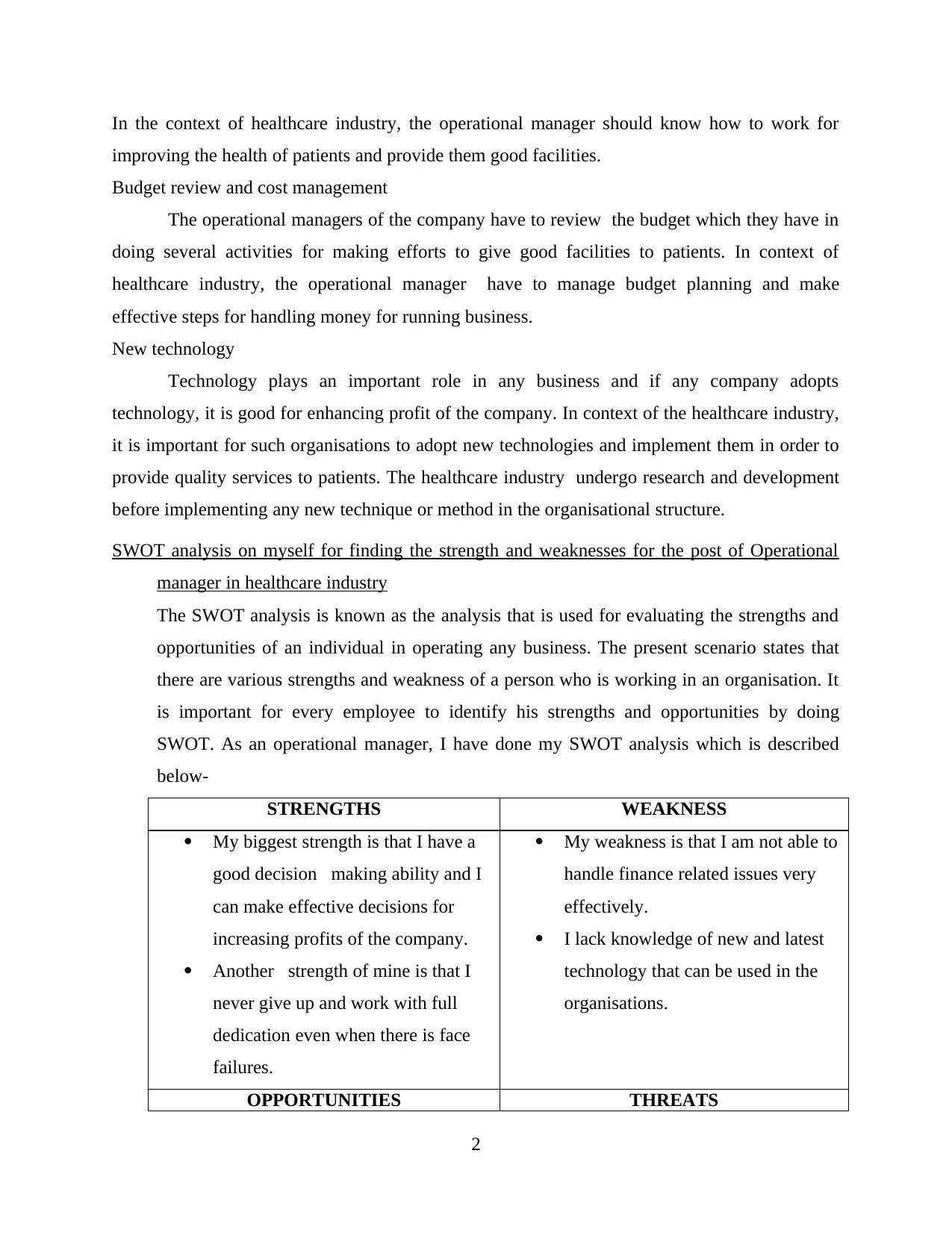
In the context of healthcare industry, the operational manager should know how to work for
improving the health of patients and provide them good facilities.
Budget review and cost management
The operational managers of the company have to review the budget which they have in
doing several activities for making efforts to give good facilities to patients. In context of
healthcare industry, the operational manager have to manage budget planning and make
effective steps for handling money for running business.
New technology
Technology plays an important role in any business and if any company adopts
technology, it is good for enhancing profit of the company. In context of the healthcare industry,
it is important for such organisations to adopt new technologies and implement them in order to
provide quality services to patients. The healthcare industry undergo research and development
before implementing any new technique or method in the organisational structure.
SWOT analysis on myself for finding the strength and weaknesses for the post of Operational
manager in healthcare industry
The SWOT analysis is known as the analysis that is used for evaluating the strengths and
opportunities of an individual in operating any business. The present scenario states that
there are various strengths and weakness of a person who is working in an organisation. It
is important for every employee to identify his strengths and opportunities by doing
SWOT. As an operational manager, I have done my SWOT analysis which is described
below-
STRENGTHS WEAKNESS
My biggest strength is that I have a
good decision making ability and I
can make effective decisions for
increasing profits of the company.
Another strength of mine is that I
never give up and work with full
dedication even when there is face
failures.
My weakness is that I am not able to
handle finance related issues very
effectively.
I lack knowledge of new and latest
technology that can be used in the
organisations.
OPPORTUNITIES THREATS
2
improving the health of patients and provide them good facilities.
Budget review and cost management
The operational managers of the company have to review the budget which they have in
doing several activities for making efforts to give good facilities to patients. In context of
healthcare industry, the operational manager have to manage budget planning and make
effective steps for handling money for running business.
New technology
Technology plays an important role in any business and if any company adopts
technology, it is good for enhancing profit of the company. In context of the healthcare industry,
it is important for such organisations to adopt new technologies and implement them in order to
provide quality services to patients. The healthcare industry undergo research and development
before implementing any new technique or method in the organisational structure.
SWOT analysis on myself for finding the strength and weaknesses for the post of Operational
manager in healthcare industry
The SWOT analysis is known as the analysis that is used for evaluating the strengths and
opportunities of an individual in operating any business. The present scenario states that
there are various strengths and weakness of a person who is working in an organisation. It
is important for every employee to identify his strengths and opportunities by doing
SWOT. As an operational manager, I have done my SWOT analysis which is described
below-
STRENGTHS WEAKNESS
My biggest strength is that I have a
good decision making ability and I
can make effective decisions for
increasing profits of the company.
Another strength of mine is that I
never give up and work with full
dedication even when there is face
failures.
My weakness is that I am not able to
handle finance related issues very
effectively.
I lack knowledge of new and latest
technology that can be used in the
organisations.
OPPORTUNITIES THREATS
2
Secure Best Marks with AI Grader
Need help grading? Try our AI Grader for instant feedback on your assignments.
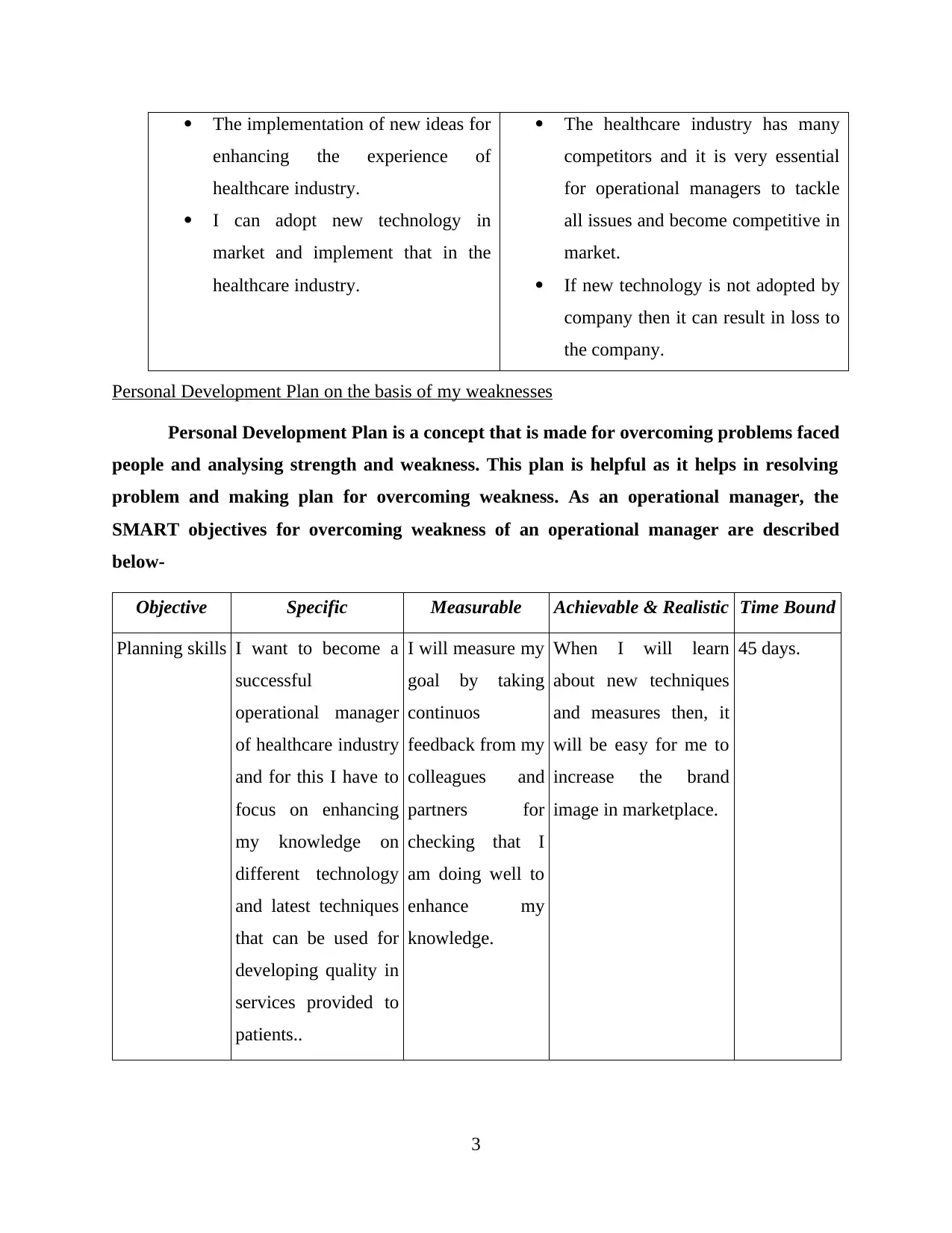
The implementation of new ideas for
enhancing the experience of
healthcare industry.
I can adopt new technology in
market and implement that in the
healthcare industry.
The healthcare industry has many
competitors and it is very essential
for operational managers to tackle
all issues and become competitive in
market.
If new technology is not adopted by
company then it can result in loss to
the company.
Personal Development Plan on the basis of my weaknesses
Personal Development Plan is a concept that is made for overcoming problems faced
people and analysing strength and weakness. This plan is helpful as it helps in resolving
problem and making plan for overcoming weakness. As an operational manager, the
SMART objectives for overcoming weakness of an operational manager are described
below-
Objective Specific Measurable Achievable & Realistic Time Bound
Planning skills I want to become a
successful
operational manager
of healthcare industry
and for this I have to
focus on enhancing
my knowledge on
different technology
and latest techniques
that can be used for
developing quality in
services provided to
patients..
I will measure my
goal by taking
continuos
feedback from my
colleagues and
partners for
checking that I
am doing well to
enhance my
knowledge.
When I will learn
about new techniques
and measures then, it
will be easy for me to
increase the brand
image in marketplace.
45 days.
3
enhancing the experience of
healthcare industry.
I can adopt new technology in
market and implement that in the
healthcare industry.
The healthcare industry has many
competitors and it is very essential
for operational managers to tackle
all issues and become competitive in
market.
If new technology is not adopted by
company then it can result in loss to
the company.
Personal Development Plan on the basis of my weaknesses
Personal Development Plan is a concept that is made for overcoming problems faced
people and analysing strength and weakness. This plan is helpful as it helps in resolving
problem and making plan for overcoming weakness. As an operational manager, the
SMART objectives for overcoming weakness of an operational manager are described
below-
Objective Specific Measurable Achievable & Realistic Time Bound
Planning skills I want to become a
successful
operational manager
of healthcare industry
and for this I have to
focus on enhancing
my knowledge on
different technology
and latest techniques
that can be used for
developing quality in
services provided to
patients..
I will measure my
goal by taking
continuos
feedback from my
colleagues and
partners for
checking that I
am doing well to
enhance my
knowledge.
When I will learn
about new techniques
and measures then, it
will be easy for me to
increase the brand
image in marketplace.
45 days.
3
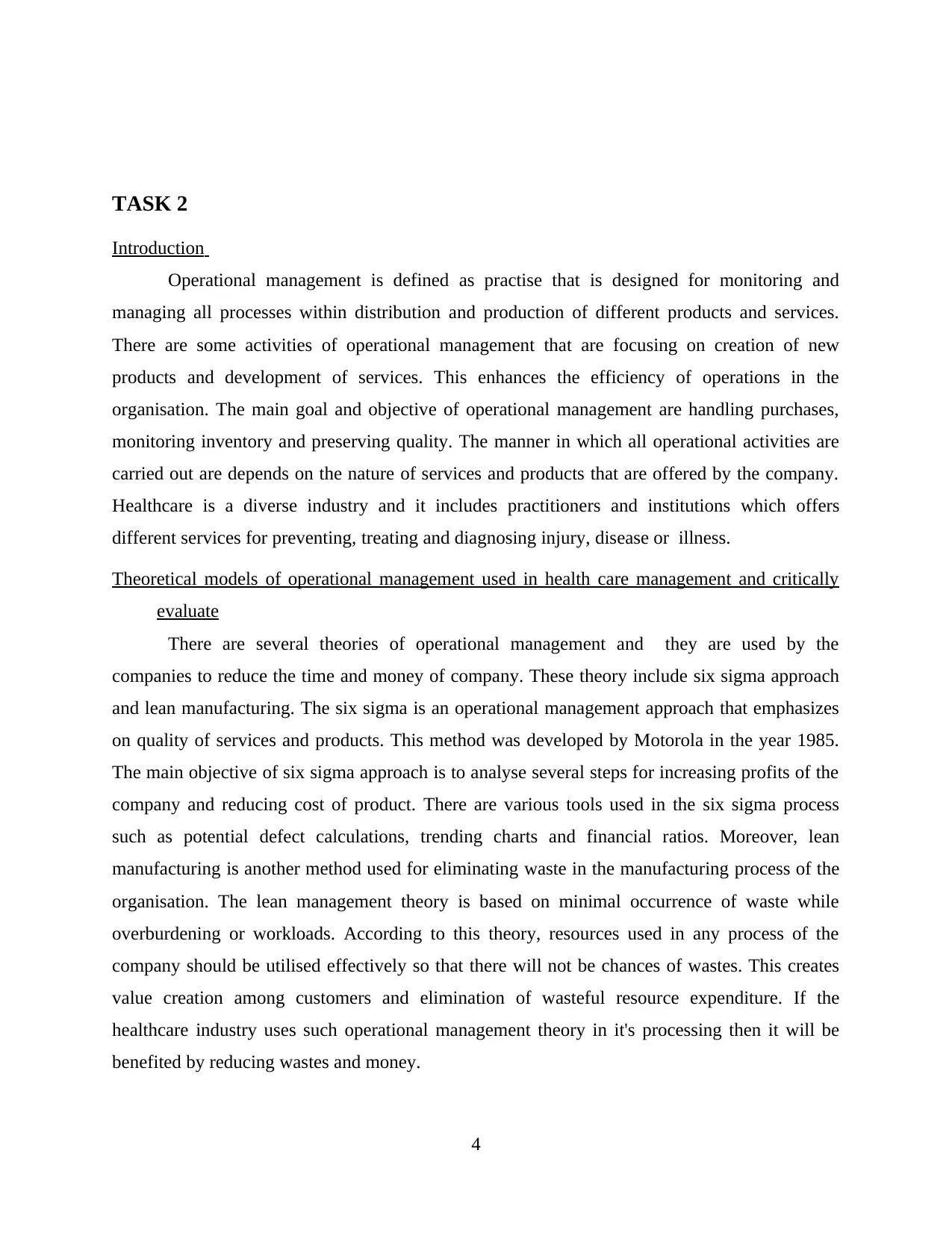
TASK 2
Introduction
Operational management is defined as practise that is designed for monitoring and
managing all processes within distribution and production of different products and services.
There are some activities of operational management that are focusing on creation of new
products and development of services. This enhances the efficiency of operations in the
organisation. The main goal and objective of operational management are handling purchases,
monitoring inventory and preserving quality. The manner in which all operational activities are
carried out are depends on the nature of services and products that are offered by the company.
Healthcare is a diverse industry and it includes practitioners and institutions which offers
different services for preventing, treating and diagnosing injury, disease or illness.
Theoretical models of operational management used in health care management and critically
evaluate
There are several theories of operational management and they are used by the
companies to reduce the time and money of company. These theory include six sigma approach
and lean manufacturing. The six sigma is an operational management approach that emphasizes
on quality of services and products. This method was developed by Motorola in the year 1985.
The main objective of six sigma approach is to analyse several steps for increasing profits of the
company and reducing cost of product. There are various tools used in the six sigma process
such as potential defect calculations, trending charts and financial ratios. Moreover, lean
manufacturing is another method used for eliminating waste in the manufacturing process of the
organisation. The lean management theory is based on minimal occurrence of waste while
overburdening or workloads. According to this theory, resources used in any process of the
company should be utilised effectively so that there will not be chances of wastes. This creates
value creation among customers and elimination of wasteful resource expenditure. If the
healthcare industry uses such operational management theory in it's processing then it will be
benefited by reducing wastes and money.
4
Introduction
Operational management is defined as practise that is designed for monitoring and
managing all processes within distribution and production of different products and services.
There are some activities of operational management that are focusing on creation of new
products and development of services. This enhances the efficiency of operations in the
organisation. The main goal and objective of operational management are handling purchases,
monitoring inventory and preserving quality. The manner in which all operational activities are
carried out are depends on the nature of services and products that are offered by the company.
Healthcare is a diverse industry and it includes practitioners and institutions which offers
different services for preventing, treating and diagnosing injury, disease or illness.
Theoretical models of operational management used in health care management and critically
evaluate
There are several theories of operational management and they are used by the
companies to reduce the time and money of company. These theory include six sigma approach
and lean manufacturing. The six sigma is an operational management approach that emphasizes
on quality of services and products. This method was developed by Motorola in the year 1985.
The main objective of six sigma approach is to analyse several steps for increasing profits of the
company and reducing cost of product. There are various tools used in the six sigma process
such as potential defect calculations, trending charts and financial ratios. Moreover, lean
manufacturing is another method used for eliminating waste in the manufacturing process of the
organisation. The lean management theory is based on minimal occurrence of waste while
overburdening or workloads. According to this theory, resources used in any process of the
company should be utilised effectively so that there will not be chances of wastes. This creates
value creation among customers and elimination of wasteful resource expenditure. If the
healthcare industry uses such operational management theory in it's processing then it will be
benefited by reducing wastes and money.
4
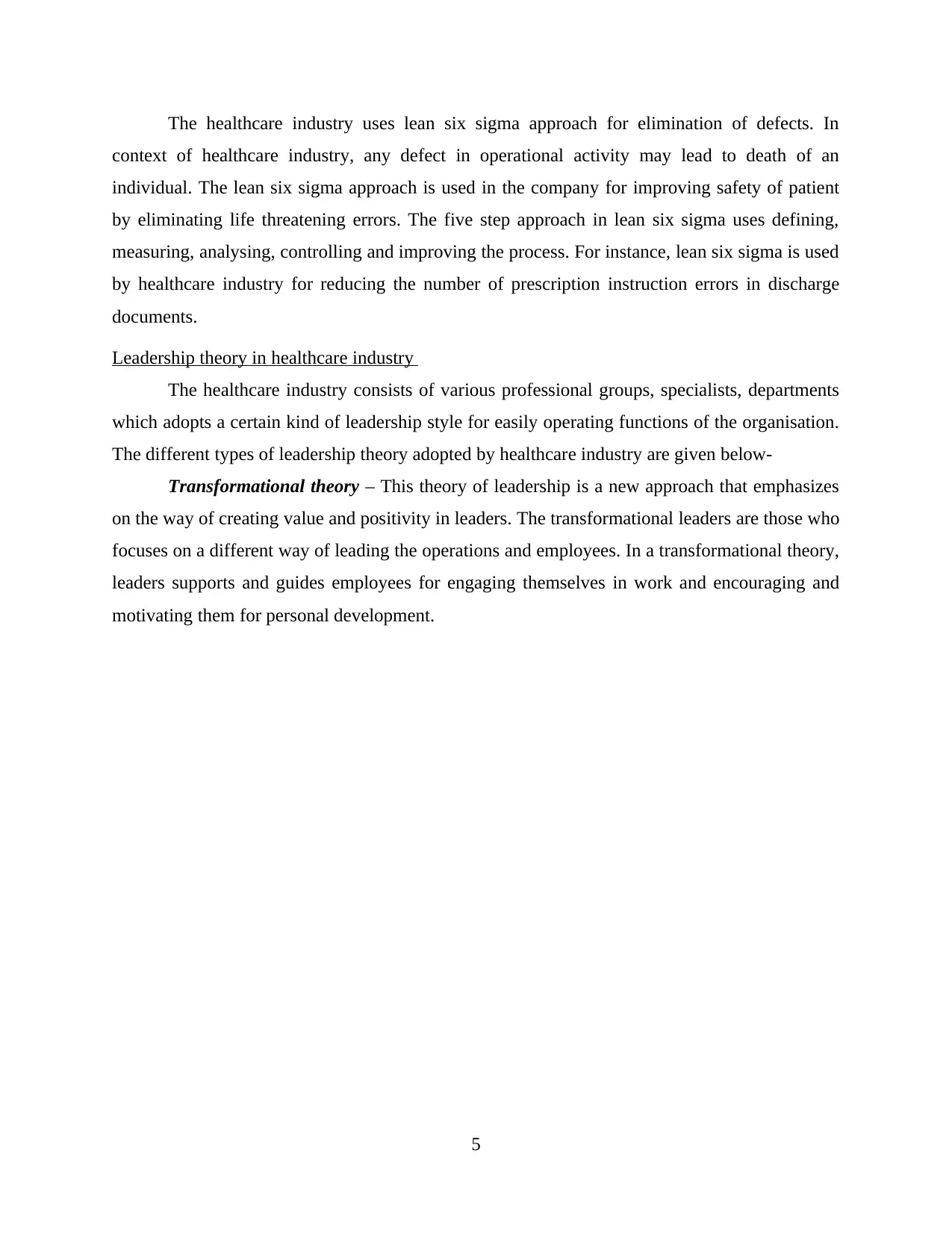
The healthcare industry uses lean six sigma approach for elimination of defects. In
context of healthcare industry, any defect in operational activity may lead to death of an
individual. The lean six sigma approach is used in the company for improving safety of patient
by eliminating life threatening errors. The five step approach in lean six sigma uses defining,
measuring, analysing, controlling and improving the process. For instance, lean six sigma is used
by healthcare industry for reducing the number of prescription instruction errors in discharge
documents.
Leadership theory in healthcare industry
The healthcare industry consists of various professional groups, specialists, departments
which adopts a certain kind of leadership style for easily operating functions of the organisation.
The different types of leadership theory adopted by healthcare industry are given below-
Transformational theory – This theory of leadership is a new approach that emphasizes
on the way of creating value and positivity in leaders. The transformational leaders are those who
focuses on a different way of leading the operations and employees. In a transformational theory,
leaders supports and guides employees for engaging themselves in work and encouraging and
motivating them for personal development.
5
context of healthcare industry, any defect in operational activity may lead to death of an
individual. The lean six sigma approach is used in the company for improving safety of patient
by eliminating life threatening errors. The five step approach in lean six sigma uses defining,
measuring, analysing, controlling and improving the process. For instance, lean six sigma is used
by healthcare industry for reducing the number of prescription instruction errors in discharge
documents.
Leadership theory in healthcare industry
The healthcare industry consists of various professional groups, specialists, departments
which adopts a certain kind of leadership style for easily operating functions of the organisation.
The different types of leadership theory adopted by healthcare industry are given below-
Transformational theory – This theory of leadership is a new approach that emphasizes
on the way of creating value and positivity in leaders. The transformational leaders are those who
focuses on a different way of leading the operations and employees. In a transformational theory,
leaders supports and guides employees for engaging themselves in work and encouraging and
motivating them for personal development.
5
Paraphrase This Document
Need a fresh take? Get an instant paraphrase of this document with our AI Paraphraser
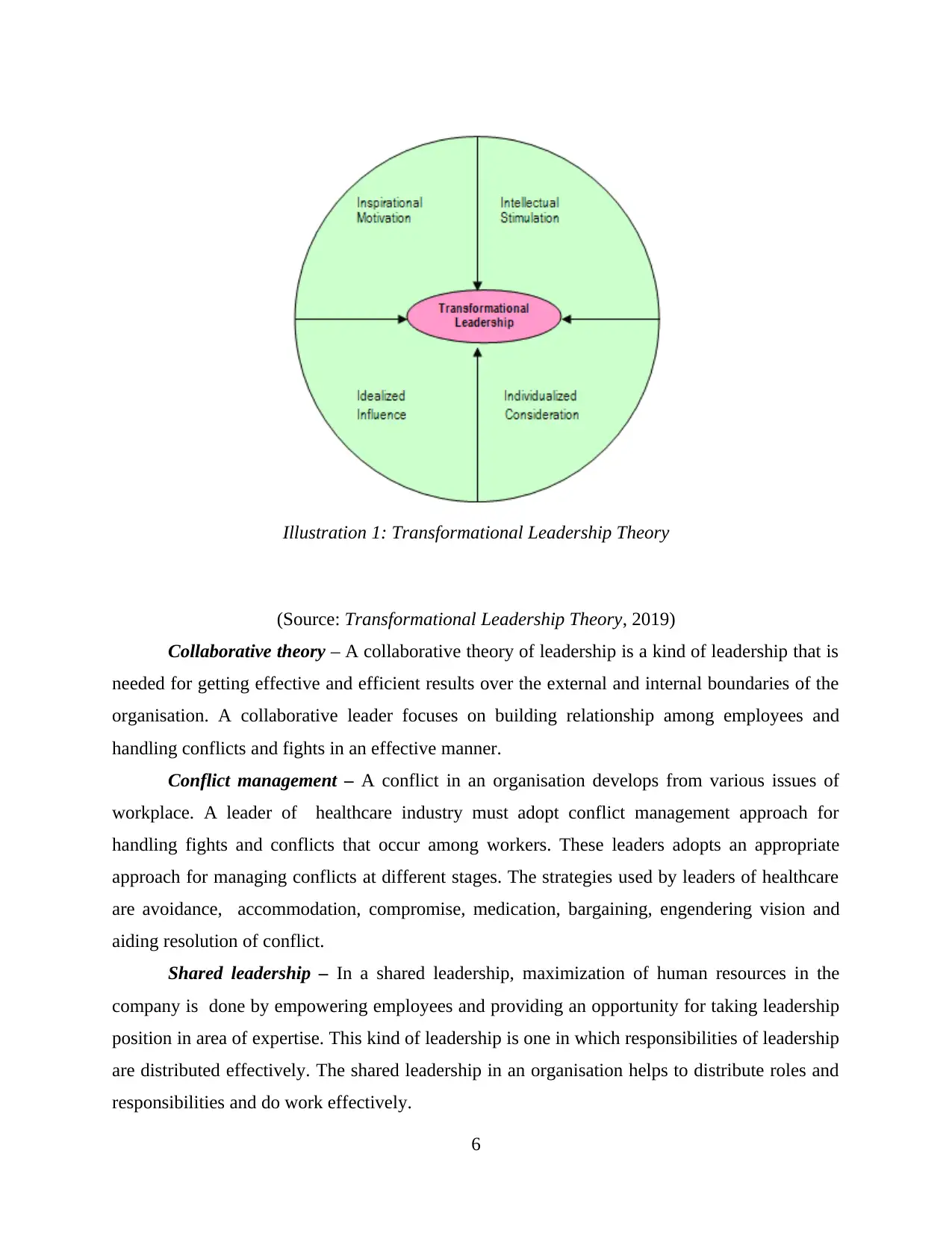
(Source: Transformational Leadership Theory, 2019)
Collaborative theory – A collaborative theory of leadership is a kind of leadership that is
needed for getting effective and efficient results over the external and internal boundaries of the
organisation. A collaborative leader focuses on building relationship among employees and
handling conflicts and fights in an effective manner.
Conflict management – A conflict in an organisation develops from various issues of
workplace. A leader of healthcare industry must adopt conflict management approach for
handling fights and conflicts that occur among workers. These leaders adopts an appropriate
approach for managing conflicts at different stages. The strategies used by leaders of healthcare
are avoidance, accommodation, compromise, medication, bargaining, engendering vision and
aiding resolution of conflict.
Shared leadership – In a shared leadership, maximization of human resources in the
company is done by empowering employees and providing an opportunity for taking leadership
position in area of expertise. This kind of leadership is one in which responsibilities of leadership
are distributed effectively. The shared leadership in an organisation helps to distribute roles and
responsibilities and do work effectively.
6
Illustration 1: Transformational Leadership Theory
Collaborative theory – A collaborative theory of leadership is a kind of leadership that is
needed for getting effective and efficient results over the external and internal boundaries of the
organisation. A collaborative leader focuses on building relationship among employees and
handling conflicts and fights in an effective manner.
Conflict management – A conflict in an organisation develops from various issues of
workplace. A leader of healthcare industry must adopt conflict management approach for
handling fights and conflicts that occur among workers. These leaders adopts an appropriate
approach for managing conflicts at different stages. The strategies used by leaders of healthcare
are avoidance, accommodation, compromise, medication, bargaining, engendering vision and
aiding resolution of conflict.
Shared leadership – In a shared leadership, maximization of human resources in the
company is done by empowering employees and providing an opportunity for taking leadership
position in area of expertise. This kind of leadership is one in which responsibilities of leadership
are distributed effectively. The shared leadership in an organisation helps to distribute roles and
responsibilities and do work effectively.
6
Illustration 1: Transformational Leadership Theory
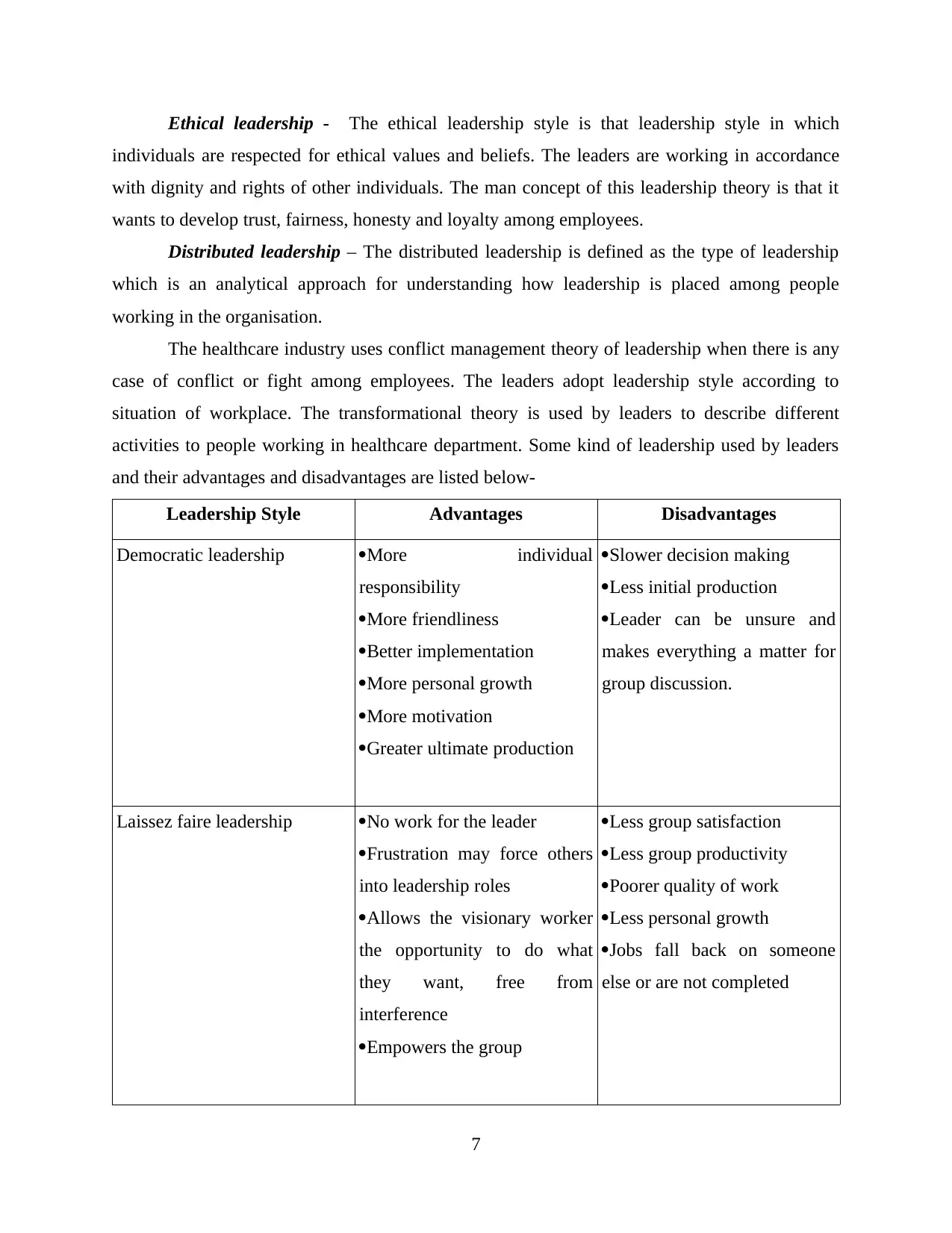
Ethical leadership - The ethical leadership style is that leadership style in which
individuals are respected for ethical values and beliefs. The leaders are working in accordance
with dignity and rights of other individuals. The man concept of this leadership theory is that it
wants to develop trust, fairness, honesty and loyalty among employees.
Distributed leadership – The distributed leadership is defined as the type of leadership
which is an analytical approach for understanding how leadership is placed among people
working in the organisation.
The healthcare industry uses conflict management theory of leadership when there is any
case of conflict or fight among employees. The leaders adopt leadership style according to
situation of workplace. The transformational theory is used by leaders to describe different
activities to people working in healthcare department. Some kind of leadership used by leaders
and their advantages and disadvantages are listed below-
Leadership Style Advantages Disadvantages
Democratic leadership More individual
responsibility
More friendliness
Better implementation
More personal growth
More motivation
Greater ultimate production
Slower decision making
Less initial production
Leader can be unsure and
makes everything a matter for
group discussion.
Laissez faire leadership No work for the leader
Frustration may force others
into leadership roles
Allows the visionary worker
the opportunity to do what
they want, free from
interference
Empowers the group
Less group satisfaction
Less group productivity
Poorer quality of work
Less personal growth
Jobs fall back on someone
else or are not completed
7
individuals are respected for ethical values and beliefs. The leaders are working in accordance
with dignity and rights of other individuals. The man concept of this leadership theory is that it
wants to develop trust, fairness, honesty and loyalty among employees.
Distributed leadership – The distributed leadership is defined as the type of leadership
which is an analytical approach for understanding how leadership is placed among people
working in the organisation.
The healthcare industry uses conflict management theory of leadership when there is any
case of conflict or fight among employees. The leaders adopt leadership style according to
situation of workplace. The transformational theory is used by leaders to describe different
activities to people working in healthcare department. Some kind of leadership used by leaders
and their advantages and disadvantages are listed below-
Leadership Style Advantages Disadvantages
Democratic leadership More individual
responsibility
More friendliness
Better implementation
More personal growth
More motivation
Greater ultimate production
Slower decision making
Less initial production
Leader can be unsure and
makes everything a matter for
group discussion.
Laissez faire leadership No work for the leader
Frustration may force others
into leadership roles
Allows the visionary worker
the opportunity to do what
they want, free from
interference
Empowers the group
Less group satisfaction
Less group productivity
Poorer quality of work
Less personal growth
Jobs fall back on someone
else or are not completed
7
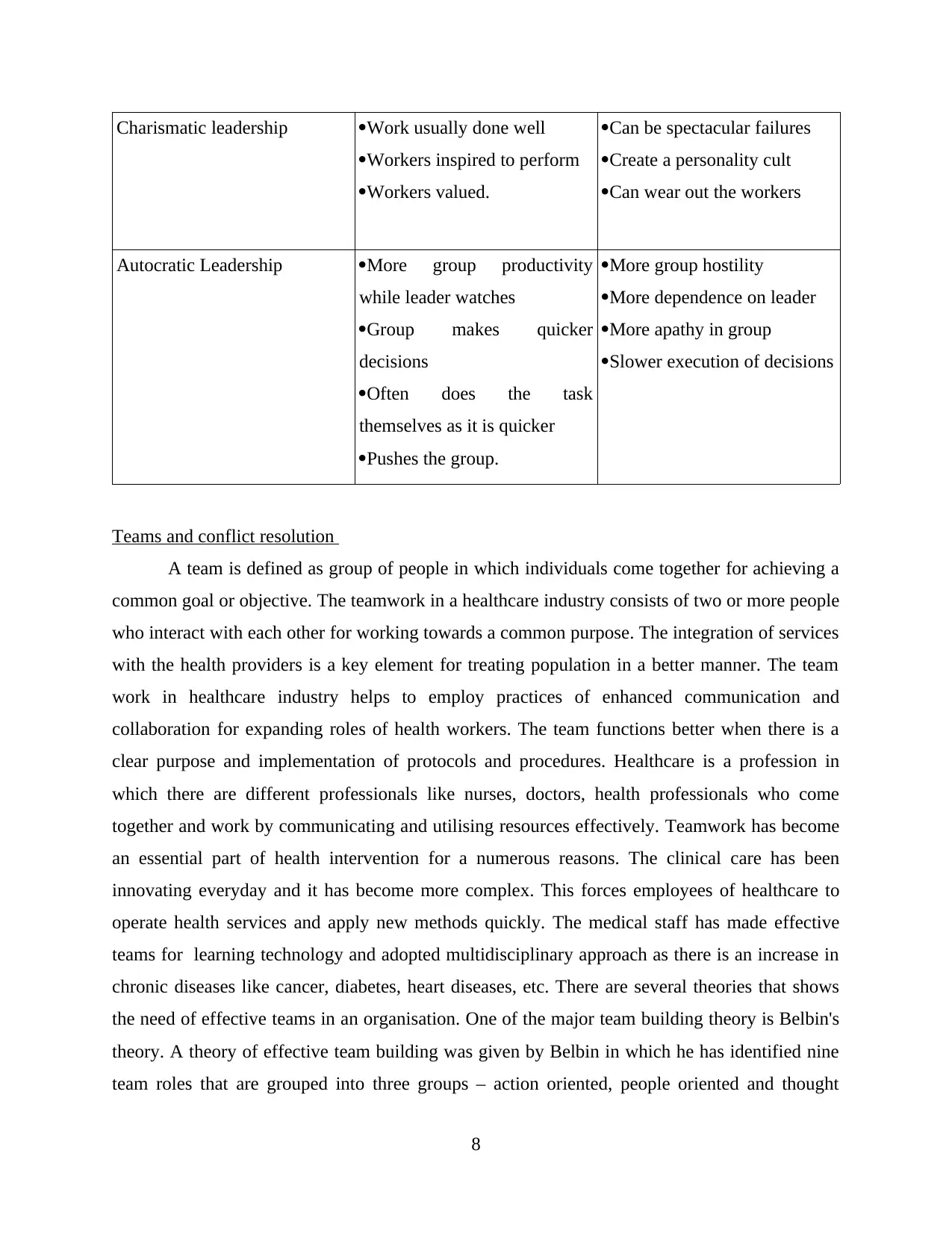
Charismatic leadership Work usually done well
Workers inspired to perform
Workers valued.
Can be spectacular failures
Create a personality cult
Can wear out the workers
Autocratic Leadership More group productivity
while leader watches
Group makes quicker
decisions
Often does the task
themselves as it is quicker
Pushes the group.
More group hostility
More dependence on leader
More apathy in group
Slower execution of decisions
Teams and conflict resolution
A team is defined as group of people in which individuals come together for achieving a
common goal or objective. The teamwork in a healthcare industry consists of two or more people
who interact with each other for working towards a common purpose. The integration of services
with the health providers is a key element for treating population in a better manner. The team
work in healthcare industry helps to employ practices of enhanced communication and
collaboration for expanding roles of health workers. The team functions better when there is a
clear purpose and implementation of protocols and procedures. Healthcare is a profession in
which there are different professionals like nurses, doctors, health professionals who come
together and work by communicating and utilising resources effectively. Teamwork has become
an essential part of health intervention for a numerous reasons. The clinical care has been
innovating everyday and it has become more complex. This forces employees of healthcare to
operate health services and apply new methods quickly. The medical staff has made effective
teams for learning technology and adopted multidisciplinary approach as there is an increase in
chronic diseases like cancer, diabetes, heart diseases, etc. There are several theories that shows
the need of effective teams in an organisation. One of the major team building theory is Belbin's
theory. A theory of effective team building was given by Belbin in which he has identified nine
team roles that are grouped into three groups – action oriented, people oriented and thought
8
Workers inspired to perform
Workers valued.
Can be spectacular failures
Create a personality cult
Can wear out the workers
Autocratic Leadership More group productivity
while leader watches
Group makes quicker
decisions
Often does the task
themselves as it is quicker
Pushes the group.
More group hostility
More dependence on leader
More apathy in group
Slower execution of decisions
Teams and conflict resolution
A team is defined as group of people in which individuals come together for achieving a
common goal or objective. The teamwork in a healthcare industry consists of two or more people
who interact with each other for working towards a common purpose. The integration of services
with the health providers is a key element for treating population in a better manner. The team
work in healthcare industry helps to employ practices of enhanced communication and
collaboration for expanding roles of health workers. The team functions better when there is a
clear purpose and implementation of protocols and procedures. Healthcare is a profession in
which there are different professionals like nurses, doctors, health professionals who come
together and work by communicating and utilising resources effectively. Teamwork has become
an essential part of health intervention for a numerous reasons. The clinical care has been
innovating everyday and it has become more complex. This forces employees of healthcare to
operate health services and apply new methods quickly. The medical staff has made effective
teams for learning technology and adopted multidisciplinary approach as there is an increase in
chronic diseases like cancer, diabetes, heart diseases, etc. There are several theories that shows
the need of effective teams in an organisation. One of the major team building theory is Belbin's
theory. A theory of effective team building was given by Belbin in which he has identified nine
team roles that are grouped into three groups – action oriented, people oriented and thought
8
Secure Best Marks with AI Grader
Need help grading? Try our AI Grader for instant feedback on your assignments.
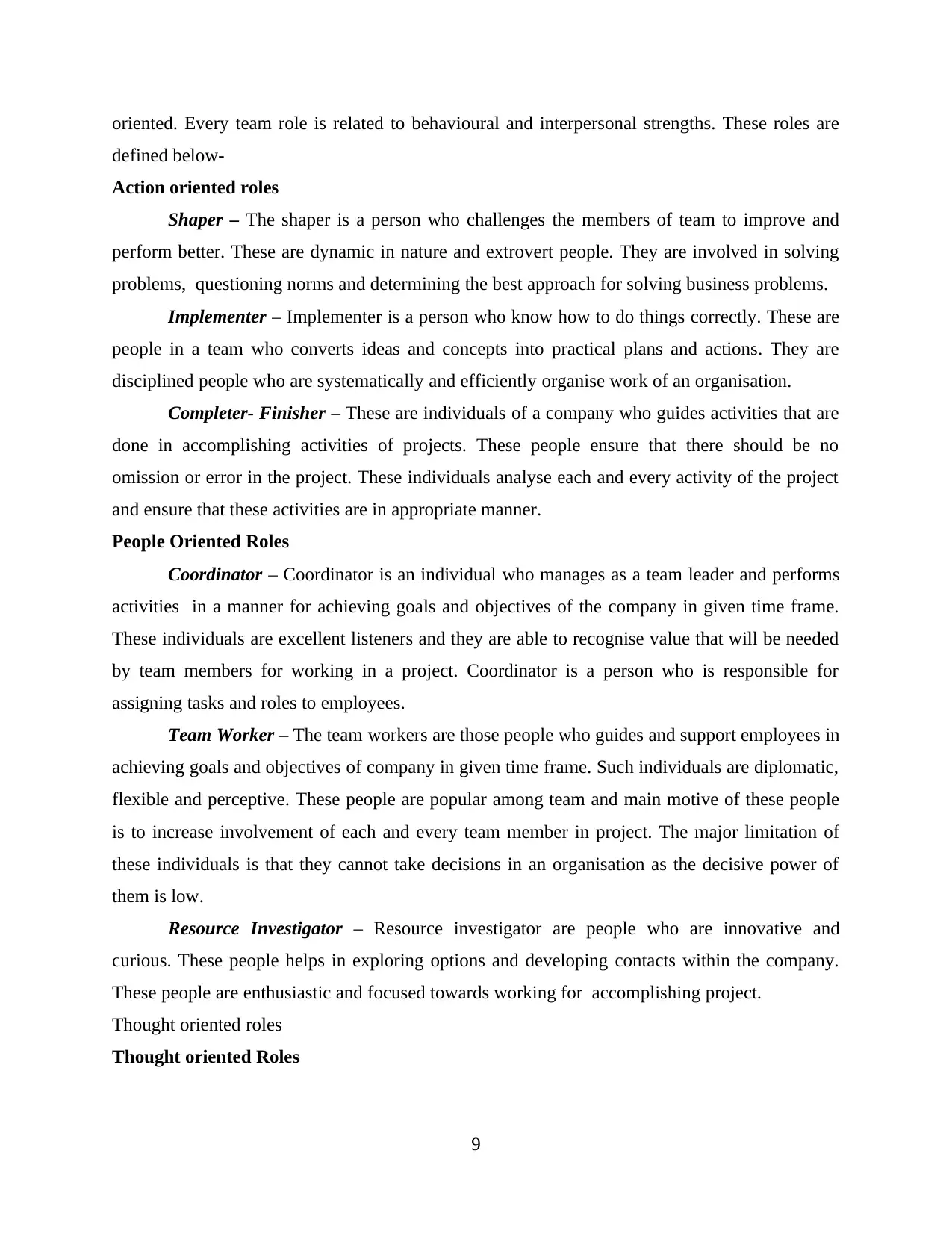
oriented. Every team role is related to behavioural and interpersonal strengths. These roles are
defined below-
Action oriented roles
Shaper – The shaper is a person who challenges the members of team to improve and
perform better. These are dynamic in nature and extrovert people. They are involved in solving
problems, questioning norms and determining the best approach for solving business problems.
Implementer – Implementer is a person who know how to do things correctly. These are
people in a team who converts ideas and concepts into practical plans and actions. They are
disciplined people who are systematically and efficiently organise work of an organisation.
Completer- Finisher – These are individuals of a company who guides activities that are
done in accomplishing activities of projects. These people ensure that there should be no
omission or error in the project. These individuals analyse each and every activity of the project
and ensure that these activities are in appropriate manner.
People Oriented Roles
Coordinator – Coordinator is an individual who manages as a team leader and performs
activities in a manner for achieving goals and objectives of the company in given time frame.
These individuals are excellent listeners and they are able to recognise value that will be needed
by team members for working in a project. Coordinator is a person who is responsible for
assigning tasks and roles to employees.
Team Worker – The team workers are those people who guides and support employees in
achieving goals and objectives of company in given time frame. Such individuals are diplomatic,
flexible and perceptive. These people are popular among team and main motive of these people
is to increase involvement of each and every team member in project. The major limitation of
these individuals is that they cannot take decisions in an organisation as the decisive power of
them is low.
Resource Investigator – Resource investigator are people who are innovative and
curious. These people helps in exploring options and developing contacts within the company.
These people are enthusiastic and focused towards working for accomplishing project.
Thought oriented roles
Thought oriented Roles
9
defined below-
Action oriented roles
Shaper – The shaper is a person who challenges the members of team to improve and
perform better. These are dynamic in nature and extrovert people. They are involved in solving
problems, questioning norms and determining the best approach for solving business problems.
Implementer – Implementer is a person who know how to do things correctly. These are
people in a team who converts ideas and concepts into practical plans and actions. They are
disciplined people who are systematically and efficiently organise work of an organisation.
Completer- Finisher – These are individuals of a company who guides activities that are
done in accomplishing activities of projects. These people ensure that there should be no
omission or error in the project. These individuals analyse each and every activity of the project
and ensure that these activities are in appropriate manner.
People Oriented Roles
Coordinator – Coordinator is an individual who manages as a team leader and performs
activities in a manner for achieving goals and objectives of the company in given time frame.
These individuals are excellent listeners and they are able to recognise value that will be needed
by team members for working in a project. Coordinator is a person who is responsible for
assigning tasks and roles to employees.
Team Worker – The team workers are those people who guides and support employees in
achieving goals and objectives of company in given time frame. Such individuals are diplomatic,
flexible and perceptive. These people are popular among team and main motive of these people
is to increase involvement of each and every team member in project. The major limitation of
these individuals is that they cannot take decisions in an organisation as the decisive power of
them is low.
Resource Investigator – Resource investigator are people who are innovative and
curious. These people helps in exploring options and developing contacts within the company.
These people are enthusiastic and focused towards working for accomplishing project.
Thought oriented roles
Thought oriented Roles
9
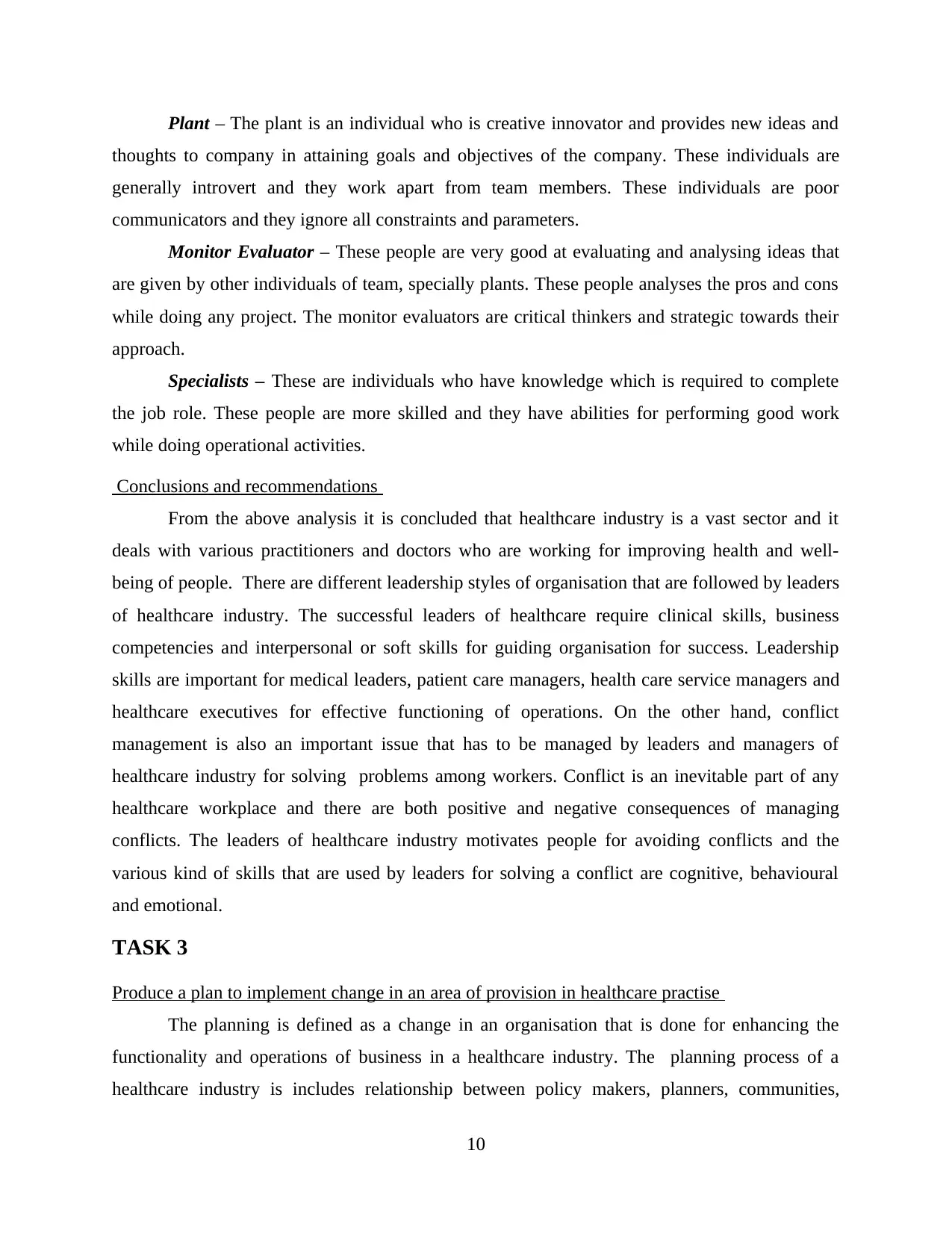
Plant – The plant is an individual who is creative innovator and provides new ideas and
thoughts to company in attaining goals and objectives of the company. These individuals are
generally introvert and they work apart from team members. These individuals are poor
communicators and they ignore all constraints and parameters.
Monitor Evaluator – These people are very good at evaluating and analysing ideas that
are given by other individuals of team, specially plants. These people analyses the pros and cons
while doing any project. The monitor evaluators are critical thinkers and strategic towards their
approach.
Specialists – These are individuals who have knowledge which is required to complete
the job role. These people are more skilled and they have abilities for performing good work
while doing operational activities.
Conclusions and recommendations
From the above analysis it is concluded that healthcare industry is a vast sector and it
deals with various practitioners and doctors who are working for improving health and well-
being of people. There are different leadership styles of organisation that are followed by leaders
of healthcare industry. The successful leaders of healthcare require clinical skills, business
competencies and interpersonal or soft skills for guiding organisation for success. Leadership
skills are important for medical leaders, patient care managers, health care service managers and
healthcare executives for effective functioning of operations. On the other hand, conflict
management is also an important issue that has to be managed by leaders and managers of
healthcare industry for solving problems among workers. Conflict is an inevitable part of any
healthcare workplace and there are both positive and negative consequences of managing
conflicts. The leaders of healthcare industry motivates people for avoiding conflicts and the
various kind of skills that are used by leaders for solving a conflict are cognitive, behavioural
and emotional.
TASK 3
Produce a plan to implement change in an area of provision in healthcare practise
The planning is defined as a change in an organisation that is done for enhancing the
functionality and operations of business in a healthcare industry. The planning process of a
healthcare industry is includes relationship between policy makers, planners, communities,
10
thoughts to company in attaining goals and objectives of the company. These individuals are
generally introvert and they work apart from team members. These individuals are poor
communicators and they ignore all constraints and parameters.
Monitor Evaluator – These people are very good at evaluating and analysing ideas that
are given by other individuals of team, specially plants. These people analyses the pros and cons
while doing any project. The monitor evaluators are critical thinkers and strategic towards their
approach.
Specialists – These are individuals who have knowledge which is required to complete
the job role. These people are more skilled and they have abilities for performing good work
while doing operational activities.
Conclusions and recommendations
From the above analysis it is concluded that healthcare industry is a vast sector and it
deals with various practitioners and doctors who are working for improving health and well-
being of people. There are different leadership styles of organisation that are followed by leaders
of healthcare industry. The successful leaders of healthcare require clinical skills, business
competencies and interpersonal or soft skills for guiding organisation for success. Leadership
skills are important for medical leaders, patient care managers, health care service managers and
healthcare executives for effective functioning of operations. On the other hand, conflict
management is also an important issue that has to be managed by leaders and managers of
healthcare industry for solving problems among workers. Conflict is an inevitable part of any
healthcare workplace and there are both positive and negative consequences of managing
conflicts. The leaders of healthcare industry motivates people for avoiding conflicts and the
various kind of skills that are used by leaders for solving a conflict are cognitive, behavioural
and emotional.
TASK 3
Produce a plan to implement change in an area of provision in healthcare practise
The planning is defined as a change in an organisation that is done for enhancing the
functionality and operations of business in a healthcare industry. The planning process of a
healthcare industry is includes relationship between policy makers, planners, communities,
10
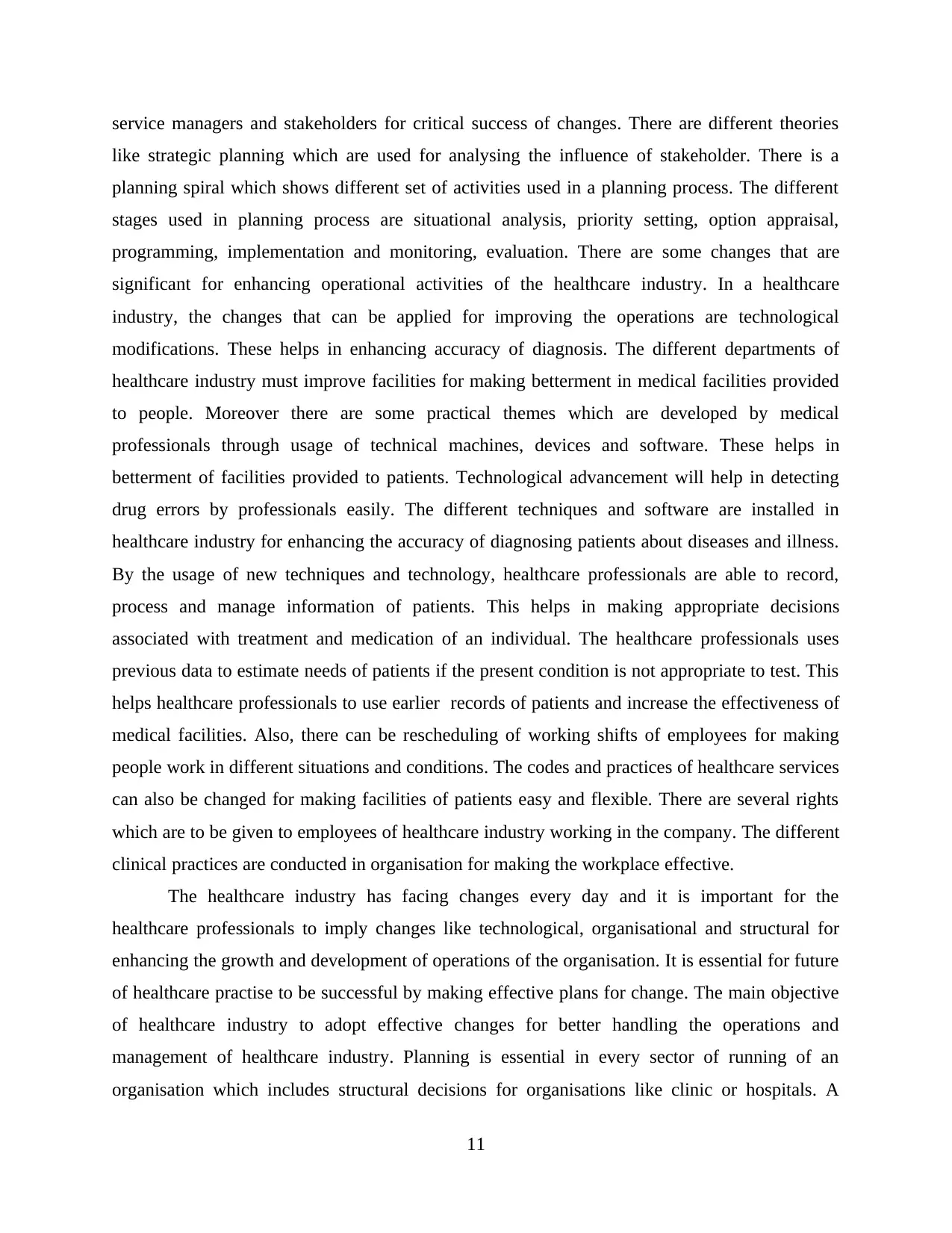
service managers and stakeholders for critical success of changes. There are different theories
like strategic planning which are used for analysing the influence of stakeholder. There is a
planning spiral which shows different set of activities used in a planning process. The different
stages used in planning process are situational analysis, priority setting, option appraisal,
programming, implementation and monitoring, evaluation. There are some changes that are
significant for enhancing operational activities of the healthcare industry. In a healthcare
industry, the changes that can be applied for improving the operations are technological
modifications. These helps in enhancing accuracy of diagnosis. The different departments of
healthcare industry must improve facilities for making betterment in medical facilities provided
to people. Moreover there are some practical themes which are developed by medical
professionals through usage of technical machines, devices and software. These helps in
betterment of facilities provided to patients. Technological advancement will help in detecting
drug errors by professionals easily. The different techniques and software are installed in
healthcare industry for enhancing the accuracy of diagnosing patients about diseases and illness.
By the usage of new techniques and technology, healthcare professionals are able to record,
process and manage information of patients. This helps in making appropriate decisions
associated with treatment and medication of an individual. The healthcare professionals uses
previous data to estimate needs of patients if the present condition is not appropriate to test. This
helps healthcare professionals to use earlier records of patients and increase the effectiveness of
medical facilities. Also, there can be rescheduling of working shifts of employees for making
people work in different situations and conditions. The codes and practices of healthcare services
can also be changed for making facilities of patients easy and flexible. There are several rights
which are to be given to employees of healthcare industry working in the company. The different
clinical practices are conducted in organisation for making the workplace effective.
The healthcare industry has facing changes every day and it is important for the
healthcare professionals to imply changes like technological, organisational and structural for
enhancing the growth and development of operations of the organisation. It is essential for future
of healthcare practise to be successful by making effective plans for change. The main objective
of healthcare industry to adopt effective changes for better handling the operations and
management of healthcare industry. Planning is essential in every sector of running of an
organisation which includes structural decisions for organisations like clinic or hospitals. A
11
like strategic planning which are used for analysing the influence of stakeholder. There is a
planning spiral which shows different set of activities used in a planning process. The different
stages used in planning process are situational analysis, priority setting, option appraisal,
programming, implementation and monitoring, evaluation. There are some changes that are
significant for enhancing operational activities of the healthcare industry. In a healthcare
industry, the changes that can be applied for improving the operations are technological
modifications. These helps in enhancing accuracy of diagnosis. The different departments of
healthcare industry must improve facilities for making betterment in medical facilities provided
to people. Moreover there are some practical themes which are developed by medical
professionals through usage of technical machines, devices and software. These helps in
betterment of facilities provided to patients. Technological advancement will help in detecting
drug errors by professionals easily. The different techniques and software are installed in
healthcare industry for enhancing the accuracy of diagnosing patients about diseases and illness.
By the usage of new techniques and technology, healthcare professionals are able to record,
process and manage information of patients. This helps in making appropriate decisions
associated with treatment and medication of an individual. The healthcare professionals uses
previous data to estimate needs of patients if the present condition is not appropriate to test. This
helps healthcare professionals to use earlier records of patients and increase the effectiveness of
medical facilities. Also, there can be rescheduling of working shifts of employees for making
people work in different situations and conditions. The codes and practices of healthcare services
can also be changed for making facilities of patients easy and flexible. There are several rights
which are to be given to employees of healthcare industry working in the company. The different
clinical practices are conducted in organisation for making the workplace effective.
The healthcare industry has facing changes every day and it is important for the
healthcare professionals to imply changes like technological, organisational and structural for
enhancing the growth and development of operations of the organisation. It is essential for future
of healthcare practise to be successful by making effective plans for change. The main objective
of healthcare industry to adopt effective changes for better handling the operations and
management of healthcare industry. Planning is essential in every sector of running of an
organisation which includes structural decisions for organisations like clinic or hospitals. A
11
Paraphrase This Document
Need a fresh take? Get an instant paraphrase of this document with our AI Paraphraser
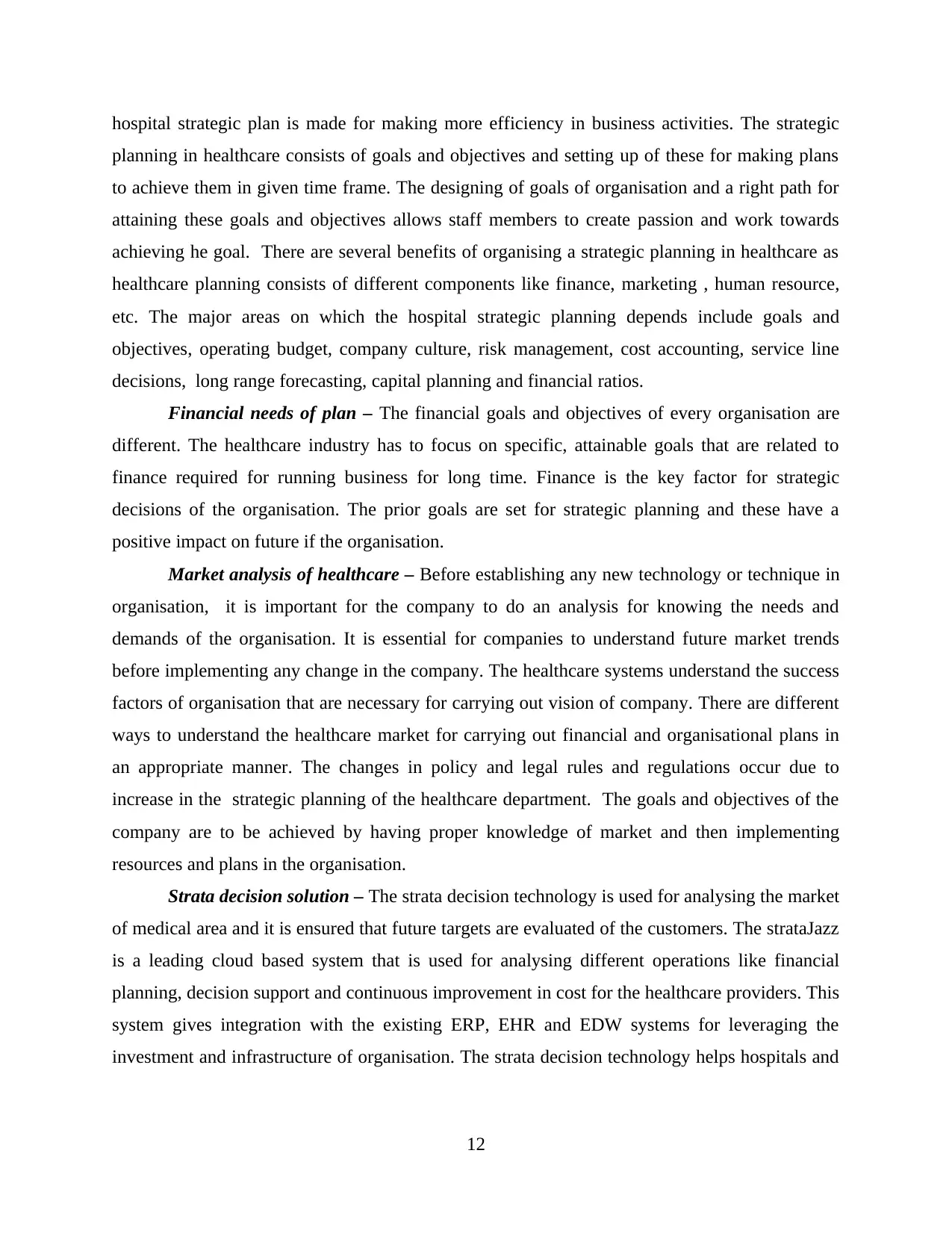
hospital strategic plan is made for making more efficiency in business activities. The strategic
planning in healthcare consists of goals and objectives and setting up of these for making plans
to achieve them in given time frame. The designing of goals of organisation and a right path for
attaining these goals and objectives allows staff members to create passion and work towards
achieving he goal. There are several benefits of organising a strategic planning in healthcare as
healthcare planning consists of different components like finance, marketing , human resource,
etc. The major areas on which the hospital strategic planning depends include goals and
objectives, operating budget, company culture, risk management, cost accounting, service line
decisions, long range forecasting, capital planning and financial ratios.
Financial needs of plan – The financial goals and objectives of every organisation are
different. The healthcare industry has to focus on specific, attainable goals that are related to
finance required for running business for long time. Finance is the key factor for strategic
decisions of the organisation. The prior goals are set for strategic planning and these have a
positive impact on future if the organisation.
Market analysis of healthcare – Before establishing any new technology or technique in
organisation, it is important for the company to do an analysis for knowing the needs and
demands of the organisation. It is essential for companies to understand future market trends
before implementing any change in the company. The healthcare systems understand the success
factors of organisation that are necessary for carrying out vision of company. There are different
ways to understand the healthcare market for carrying out financial and organisational plans in
an appropriate manner. The changes in policy and legal rules and regulations occur due to
increase in the strategic planning of the healthcare department. The goals and objectives of the
company are to be achieved by having proper knowledge of market and then implementing
resources and plans in the organisation.
Strata decision solution – The strata decision technology is used for analysing the market
of medical area and it is ensured that future targets are evaluated of the customers. The strataJazz
is a leading cloud based system that is used for analysing different operations like financial
planning, decision support and continuous improvement in cost for the healthcare providers. This
system gives integration with the existing ERP, EHR and EDW systems for leveraging the
investment and infrastructure of organisation. The strata decision technology helps hospitals and
12
planning in healthcare consists of goals and objectives and setting up of these for making plans
to achieve them in given time frame. The designing of goals of organisation and a right path for
attaining these goals and objectives allows staff members to create passion and work towards
achieving he goal. There are several benefits of organising a strategic planning in healthcare as
healthcare planning consists of different components like finance, marketing , human resource,
etc. The major areas on which the hospital strategic planning depends include goals and
objectives, operating budget, company culture, risk management, cost accounting, service line
decisions, long range forecasting, capital planning and financial ratios.
Financial needs of plan – The financial goals and objectives of every organisation are
different. The healthcare industry has to focus on specific, attainable goals that are related to
finance required for running business for long time. Finance is the key factor for strategic
decisions of the organisation. The prior goals are set for strategic planning and these have a
positive impact on future if the organisation.
Market analysis of healthcare – Before establishing any new technology or technique in
organisation, it is important for the company to do an analysis for knowing the needs and
demands of the organisation. It is essential for companies to understand future market trends
before implementing any change in the company. The healthcare systems understand the success
factors of organisation that are necessary for carrying out vision of company. There are different
ways to understand the healthcare market for carrying out financial and organisational plans in
an appropriate manner. The changes in policy and legal rules and regulations occur due to
increase in the strategic planning of the healthcare department. The goals and objectives of the
company are to be achieved by having proper knowledge of market and then implementing
resources and plans in the organisation.
Strata decision solution – The strata decision technology is used for analysing the market
of medical area and it is ensured that future targets are evaluated of the customers. The strataJazz
is a leading cloud based system that is used for analysing different operations like financial
planning, decision support and continuous improvement in cost for the healthcare providers. This
system gives integration with the existing ERP, EHR and EDW systems for leveraging the
investment and infrastructure of organisation. The strata decision technology helps hospitals and
12
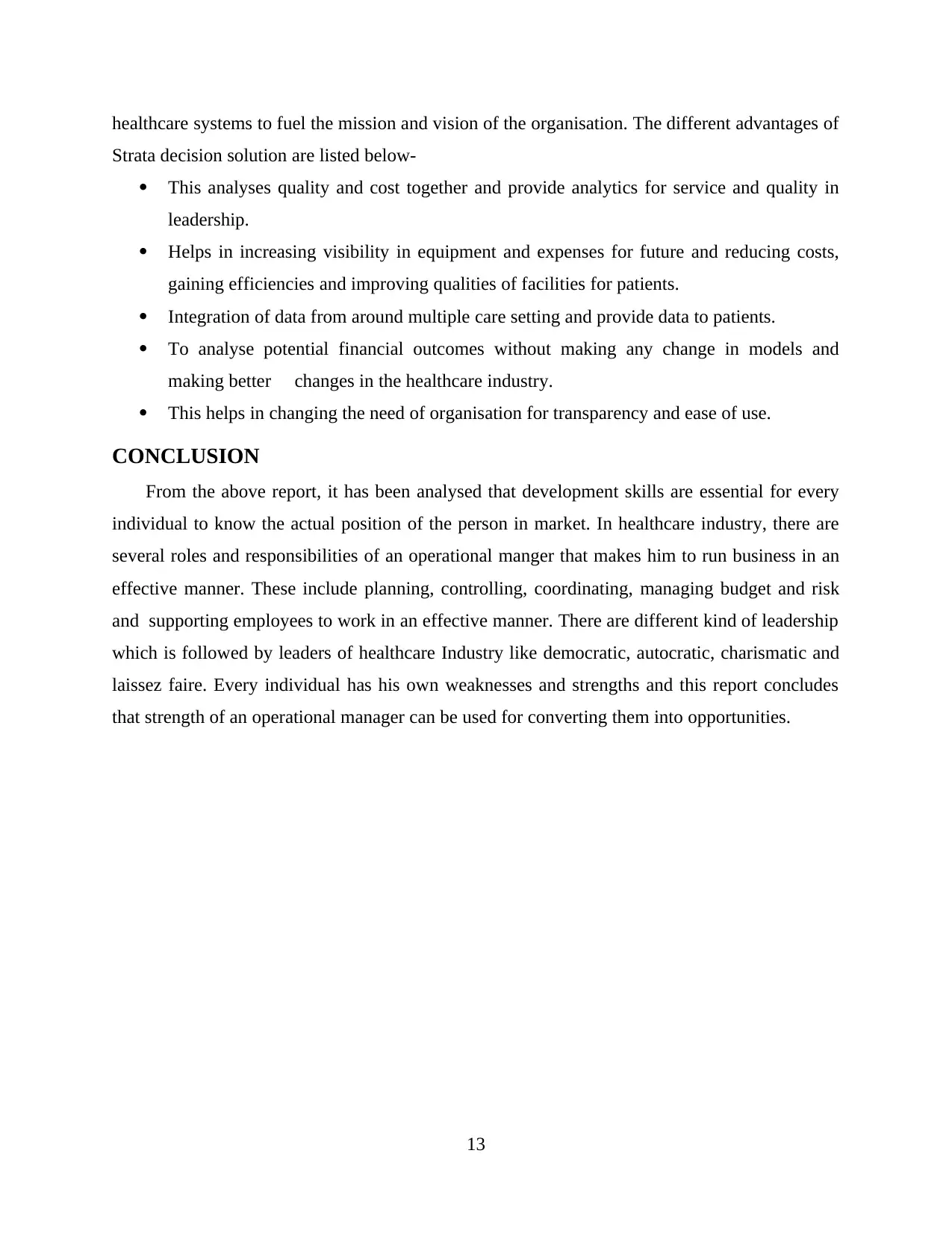
healthcare systems to fuel the mission and vision of the organisation. The different advantages of
Strata decision solution are listed below-
This analyses quality and cost together and provide analytics for service and quality in
leadership.
Helps in increasing visibility in equipment and expenses for future and reducing costs,
gaining efficiencies and improving qualities of facilities for patients.
Integration of data from around multiple care setting and provide data to patients.
To analyse potential financial outcomes without making any change in models and
making better changes in the healthcare industry.
This helps in changing the need of organisation for transparency and ease of use.
CONCLUSION
From the above report, it has been analysed that development skills are essential for every
individual to know the actual position of the person in market. In healthcare industry, there are
several roles and responsibilities of an operational manger that makes him to run business in an
effective manner. These include planning, controlling, coordinating, managing budget and risk
and supporting employees to work in an effective manner. There are different kind of leadership
which is followed by leaders of healthcare Industry like democratic, autocratic, charismatic and
laissez faire. Every individual has his own weaknesses and strengths and this report concludes
that strength of an operational manager can be used for converting them into opportunities.
13
Strata decision solution are listed below-
This analyses quality and cost together and provide analytics for service and quality in
leadership.
Helps in increasing visibility in equipment and expenses for future and reducing costs,
gaining efficiencies and improving qualities of facilities for patients.
Integration of data from around multiple care setting and provide data to patients.
To analyse potential financial outcomes without making any change in models and
making better changes in the healthcare industry.
This helps in changing the need of organisation for transparency and ease of use.
CONCLUSION
From the above report, it has been analysed that development skills are essential for every
individual to know the actual position of the person in market. In healthcare industry, there are
several roles and responsibilities of an operational manger that makes him to run business in an
effective manner. These include planning, controlling, coordinating, managing budget and risk
and supporting employees to work in an effective manner. There are different kind of leadership
which is followed by leaders of healthcare Industry like democratic, autocratic, charismatic and
laissez faire. Every individual has his own weaknesses and strengths and this report concludes
that strength of an operational manager can be used for converting them into opportunities.
13
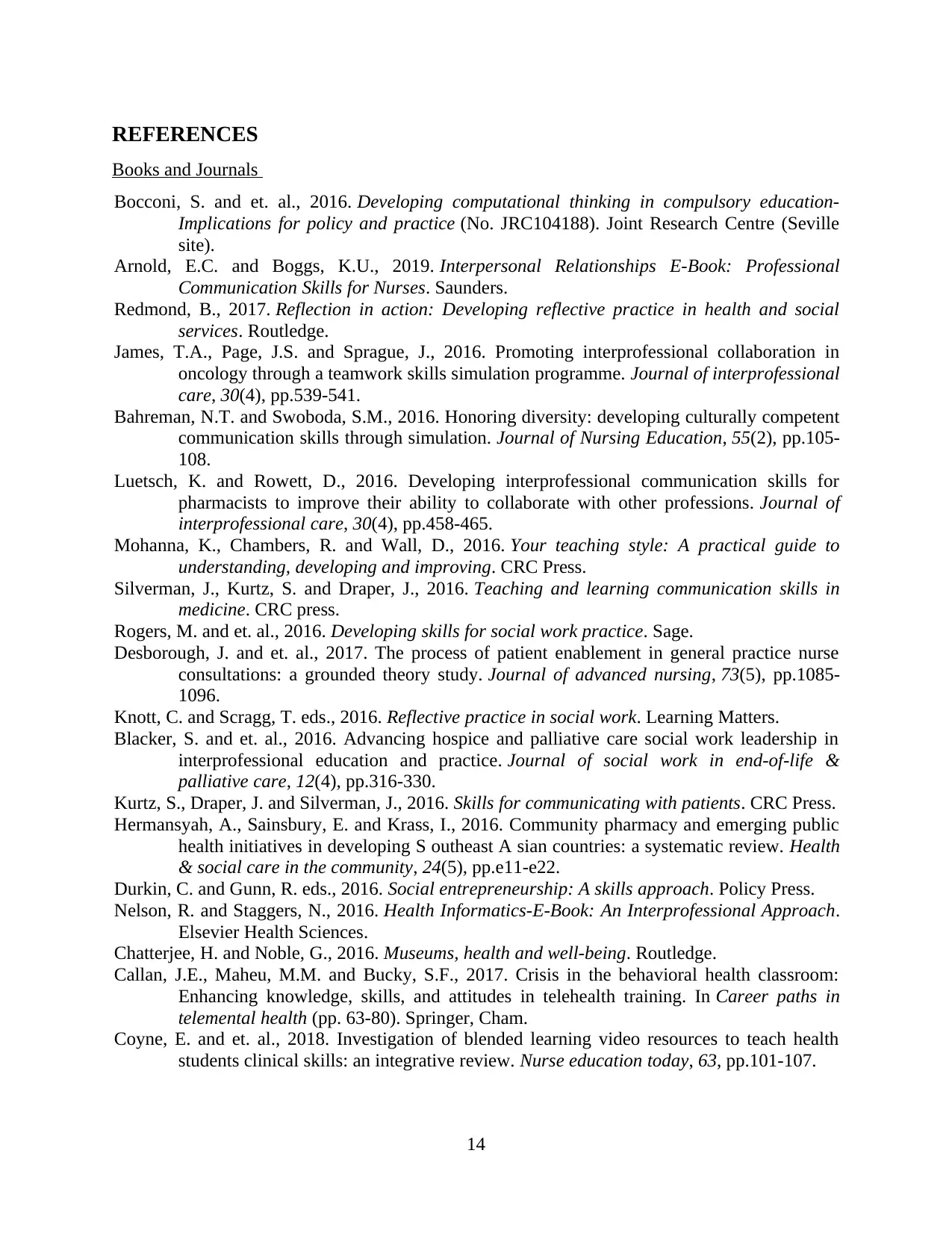
REFERENCES
Books and Journals
Bocconi, S. and et. al., 2016. Developing computational thinking in compulsory education-
Implications for policy and practice (No. JRC104188). Joint Research Centre (Seville
site).
Arnold, E.C. and Boggs, K.U., 2019. Interpersonal Relationships E-Book: Professional
Communication Skills for Nurses. Saunders.
Redmond, B., 2017. Reflection in action: Developing reflective practice in health and social
services. Routledge.
James, T.A., Page, J.S. and Sprague, J., 2016. Promoting interprofessional collaboration in
oncology through a teamwork skills simulation programme. Journal of interprofessional
care, 30(4), pp.539-541.
Bahreman, N.T. and Swoboda, S.M., 2016. Honoring diversity: developing culturally competent
communication skills through simulation. Journal of Nursing Education, 55(2), pp.105-
108.
Luetsch, K. and Rowett, D., 2016. Developing interprofessional communication skills for
pharmacists to improve their ability to collaborate with other professions. Journal of
interprofessional care, 30(4), pp.458-465.
Mohanna, K., Chambers, R. and Wall, D., 2016. Your teaching style: A practical guide to
understanding, developing and improving. CRC Press.
Silverman, J., Kurtz, S. and Draper, J., 2016. Teaching and learning communication skills in
medicine. CRC press.
Rogers, M. and et. al., 2016. Developing skills for social work practice. Sage.
Desborough, J. and et. al., 2017. The process of patient enablement in general practice nurse
consultations: a grounded theory study. Journal of advanced nursing, 73(5), pp.1085-
1096.
Knott, C. and Scragg, T. eds., 2016. Reflective practice in social work. Learning Matters.
Blacker, S. and et. al., 2016. Advancing hospice and palliative care social work leadership in
interprofessional education and practice. Journal of social work in end-of-life &
palliative care, 12(4), pp.316-330.
Kurtz, S., Draper, J. and Silverman, J., 2016. Skills for communicating with patients. CRC Press.
Hermansyah, A., Sainsbury, E. and Krass, I., 2016. Community pharmacy and emerging public
health initiatives in developing S outheast A sian countries: a systematic review. Health
& social care in the community, 24(5), pp.e11-e22.
Durkin, C. and Gunn, R. eds., 2016. Social entrepreneurship: A skills approach. Policy Press.
Nelson, R. and Staggers, N., 2016. Health Informatics-E-Book: An Interprofessional Approach.
Elsevier Health Sciences.
Chatterjee, H. and Noble, G., 2016. Museums, health and well-being. Routledge.
Callan, J.E., Maheu, M.M. and Bucky, S.F., 2017. Crisis in the behavioral health classroom:
Enhancing knowledge, skills, and attitudes in telehealth training. In Career paths in
telemental health (pp. 63-80). Springer, Cham.
Coyne, E. and et. al., 2018. Investigation of blended learning video resources to teach health
students clinical skills: an integrative review. Nurse education today, 63, pp.101-107.
14
Books and Journals
Bocconi, S. and et. al., 2016. Developing computational thinking in compulsory education-
Implications for policy and practice (No. JRC104188). Joint Research Centre (Seville
site).
Arnold, E.C. and Boggs, K.U., 2019. Interpersonal Relationships E-Book: Professional
Communication Skills for Nurses. Saunders.
Redmond, B., 2017. Reflection in action: Developing reflective practice in health and social
services. Routledge.
James, T.A., Page, J.S. and Sprague, J., 2016. Promoting interprofessional collaboration in
oncology through a teamwork skills simulation programme. Journal of interprofessional
care, 30(4), pp.539-541.
Bahreman, N.T. and Swoboda, S.M., 2016. Honoring diversity: developing culturally competent
communication skills through simulation. Journal of Nursing Education, 55(2), pp.105-
108.
Luetsch, K. and Rowett, D., 2016. Developing interprofessional communication skills for
pharmacists to improve their ability to collaborate with other professions. Journal of
interprofessional care, 30(4), pp.458-465.
Mohanna, K., Chambers, R. and Wall, D., 2016. Your teaching style: A practical guide to
understanding, developing and improving. CRC Press.
Silverman, J., Kurtz, S. and Draper, J., 2016. Teaching and learning communication skills in
medicine. CRC press.
Rogers, M. and et. al., 2016. Developing skills for social work practice. Sage.
Desborough, J. and et. al., 2017. The process of patient enablement in general practice nurse
consultations: a grounded theory study. Journal of advanced nursing, 73(5), pp.1085-
1096.
Knott, C. and Scragg, T. eds., 2016. Reflective practice in social work. Learning Matters.
Blacker, S. and et. al., 2016. Advancing hospice and palliative care social work leadership in
interprofessional education and practice. Journal of social work in end-of-life &
palliative care, 12(4), pp.316-330.
Kurtz, S., Draper, J. and Silverman, J., 2016. Skills for communicating with patients. CRC Press.
Hermansyah, A., Sainsbury, E. and Krass, I., 2016. Community pharmacy and emerging public
health initiatives in developing S outheast A sian countries: a systematic review. Health
& social care in the community, 24(5), pp.e11-e22.
Durkin, C. and Gunn, R. eds., 2016. Social entrepreneurship: A skills approach. Policy Press.
Nelson, R. and Staggers, N., 2016. Health Informatics-E-Book: An Interprofessional Approach.
Elsevier Health Sciences.
Chatterjee, H. and Noble, G., 2016. Museums, health and well-being. Routledge.
Callan, J.E., Maheu, M.M. and Bucky, S.F., 2017. Crisis in the behavioral health classroom:
Enhancing knowledge, skills, and attitudes in telehealth training. In Career paths in
telemental health (pp. 63-80). Springer, Cham.
Coyne, E. and et. al., 2018. Investigation of blended learning video resources to teach health
students clinical skills: an integrative review. Nurse education today, 63, pp.101-107.
14
1 out of 16
Related Documents
Your All-in-One AI-Powered Toolkit for Academic Success.
+13062052269
info@desklib.com
Available 24*7 on WhatsApp / Email
![[object Object]](/_next/static/media/star-bottom.7253800d.svg)
Unlock your academic potential
© 2024 | Zucol Services PVT LTD | All rights reserved.





